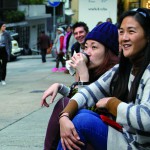Even without the proposed new law, Teakha, a café on Tai Ping Shan Street in Sheung Wan, has been charged with street obstruction multiple times in the past year. The café’s owner Nana Chan has decorated the back alley that the shop opens onto with plants and provides seats there. The first prosecution came eight months after Teakha opened in 2012. Chan has been charged around 10 times and was fined around HK$ 6,000 on each occasion.
But Chan, who is also a lawyer, says: “We are not using this space for the benefits of Teakha, but this is a space for people to socialise.”
Chan welcomes not just her customers, but anyone and everyone in the community to enjoy the space. She organises outdoor activities from time to time, varying from small-scale concerts to outdoor yoga classes to encourage a community culture.
“I think Hong Kong is one of the few places where there’s nothing going on on the streets at all,” she says and contrasts this with the hawker markets in Taiwan and street cafes in Paris.

Chan has tried to apply for outdoor seating accommodation but failed, although she is unsure of the exact reason. Instead of seats, she now provides diners with timber boxes, tree trunks and carpets to use outside. “I’ll insist on doing that even though that’s illegal because it’s a kind of culture I want to promote,” she says.
In order to gain support, she has launched an online petition which has already gained more than 800 signatures. She also organises a forum on placemaking. “Placemaking” refers to an approach to plan and manage public spaces to promote people’s health, happiness, and well-being.
One of the forum guests, Paul Zimmerman, chief executive of Designing Hong Kong and a Southern District councillor, suggests some laws in Hong Kong are out-dated and lack flexibility. Those on street regulation were drafted in the 1960s when there was severe cholera and authorities had to make the streets clean and hygienic. “That is in the heads of FEHD. That’s been the system for 50 years,” Zimmerman says. “You must have not just a negative system based on ‘let’s get rid of it all.’”
He thinks that if the government wants to have stronger law enforcement, then it also needs to have a better licensing system. Rather than letting the FEHD decide on the priority of enforcement locations, he proposes a more “positive two-process system”. The first thing would be for officials and district councils to designate areas for SFEs based on the local context; the next step is for shops to make applications for public spaces. Zimmerman says the biggest problem is authorities “ want one system for the whole of Hong Kong. They don’t know how to get localised solutions.”
Tieben Hendrik, associate professor from the School of Architecture at the Chinese University of Hong Kong, conducts research on urban transformation, heritage and identity in Hong Kong. Looking at the consultation document, he feels authorities just want to implement laws to react to people’s continuous complaints.
“I believe if we see the values, for example, of eating together, of creativity that we can see in the city, of colours of flowers, as a kind of essential quality of life, we would probably be more careful in the way we try to deal with it,” he says.
Hendrik says that while there are hawker markets and dai pai dongs in Hong Kong, they are not treasured or appreciated as something that helps foster social cohesion in a polarised society. This contrasts with cities like Singapore, which are conscious of the social importance of such features.
Hendrik believes policymakers should try to accommodate these things rather than oppose them. He suggests they should look at the broader picture of what makes successful public spaces to improve the quality of urban life. Imposing harsh laws may make it easy to clear roads for traffic, but this neglects bringing more vitality to the streets where people live.
After all, streets are our largest public spaces, ones people use every day. “If we don’t have clear values and ideas of what makes a good city, we are kind of lacking a direction. We are kind of shooting in the dark,” says Hendrick.
Edited by Antonia Wong










































